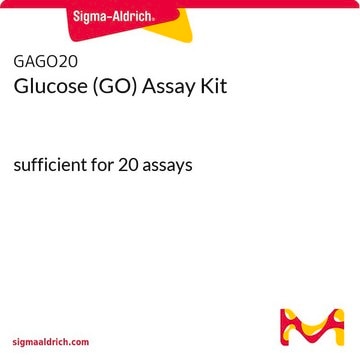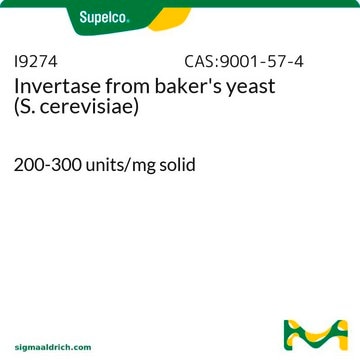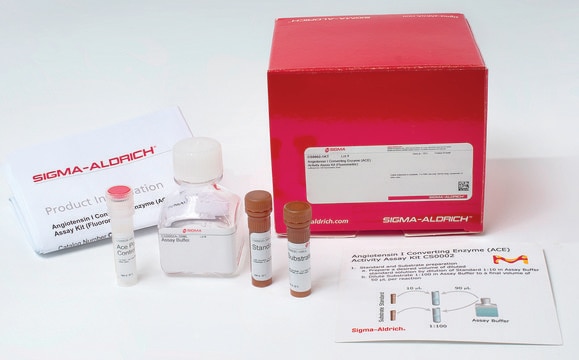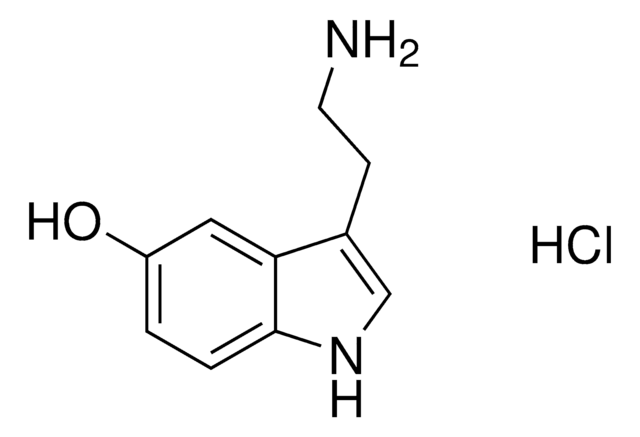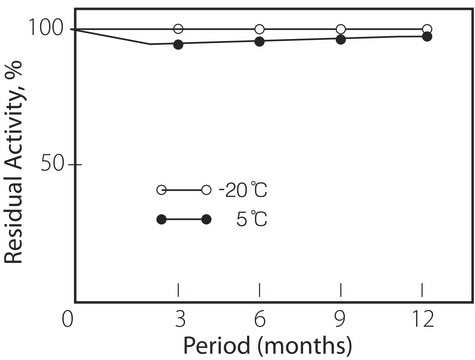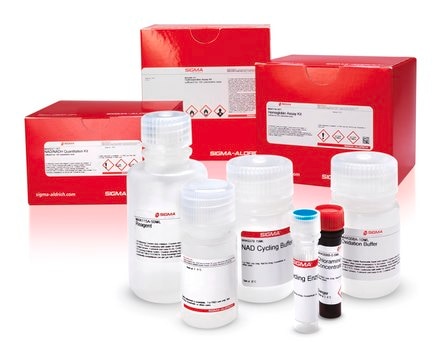MAK118
Invertase Activity Assay Kit
sufficient for 100 colorimetric or fluorometric tests
Synonym(s):
β-fructofuranosidase Assay Kit
Sign Into View Organizational & Contract Pricing
All Photos(1)
About This Item
UNSPSC Code:
12161503
NACRES:
NA.84
Recommended Products
usage
sufficient for 100 colorimetric or fluorometric tests
application(s)
cosmetics
environmental
food and beverages
detection method
colorimetric
fluorometric
storage temp.
−20°C
Related Categories
General description
Invertase (β-fructofuranosidase) is an enzyme that catalyzes the hydrolysis of sucrose to fructose and glucose. Invertase is produced by certain plants, microorganisms, and honey bees.
Application
Invertase Assay Kit has been used for screening inhibition of recombinant invertase inhibitor protein from sugarcane.
Features and Benefits
Compatible with high-throughput handling systems.
Suitability
Suitable for the detection of invertase activity in biological and environmental samples and for the screening of invertase inhibitors.
Principle
In this kit, invertase activity is determined by a coupled enzyme assay in which invertase cleaves sucrose to glucose and fructose, resulting in a colorimetric (570 nm)/fluorometric (λex = 535/λem = 587 nm) product, proportional to the invertase activity present. One unit of Invertase is the amount of enzyme that will catalyze the formation of 1.0 μmole of glucose per minute at pH 4.5 under the assay conditions.
wgk_germany
WGK 2
Certificates of Analysis (COA)
Search for Certificates of Analysis (COA) by entering the products Lot/Batch Number. Lot and Batch Numbers can be found on a product’s label following the words ‘Lot’ or ‘Batch’.
Already Own This Product?
Find documentation for the products that you have recently purchased in the Document Library.
Identification and Functional Characterization of Sugarcane Invertase Inhibitor (ShINH1): A Potential Candidate for Reducing Pre-and Post-harvest Loss of Sucrose in Sugarcane.
Shivalingamurthy S G, et al.
Frontiers in Plant Science, 9 (2018)
Roua Gabriela Popescu et al.
Animals : an open access journal from MDPI, 10(5) (2020-05-14)
The purpose of this study was to examine the effects of dietary inclusion of two additives at the final concentration of 0.5% bilberry (E1) and 1% walnut (E2) leaves powder in the basal diet on digestive health of hens. A
Domenica Farci et al.
Journal of experimental botany, 67(11), 3303-3312 (2016-04-17)
Invertases are a widespread group of enzymes that catalyse the conversion of sucrose into fructose and glucose. Plants invertases and their substrates are essential factors that play an active role in primary metabolism and in cellular differentiation and by these
Khaled M Hazzouri et al.
Nature communications, 10(1), 4680-4680 (2019-10-17)
Date palms (Phoenix dactylifera) are an important fruit crop of arid regions of the Middle East and North Africa. Despite its importance, few genomic resources exist for date palms, hampering evolutionary genomic studies of this perennial species. Here we report
Suresha G Shivalingamurthy et al.
Frontiers in plant science, 9, 598-598 (2018-05-19)
In sugarcane, invertase enzymes play a key role in sucrose accumulation and are also involved in futile reactions where sucrose is continuously degraded during the pre- and post-harvest period, thereby reducing sugar yield and recovery. Invertase inhibitor (INVINH) proteins play
Our team of scientists has experience in all areas of research including Life Science, Material Science, Chemical Synthesis, Chromatography, Analytical and many others.
Contact Technical Service

